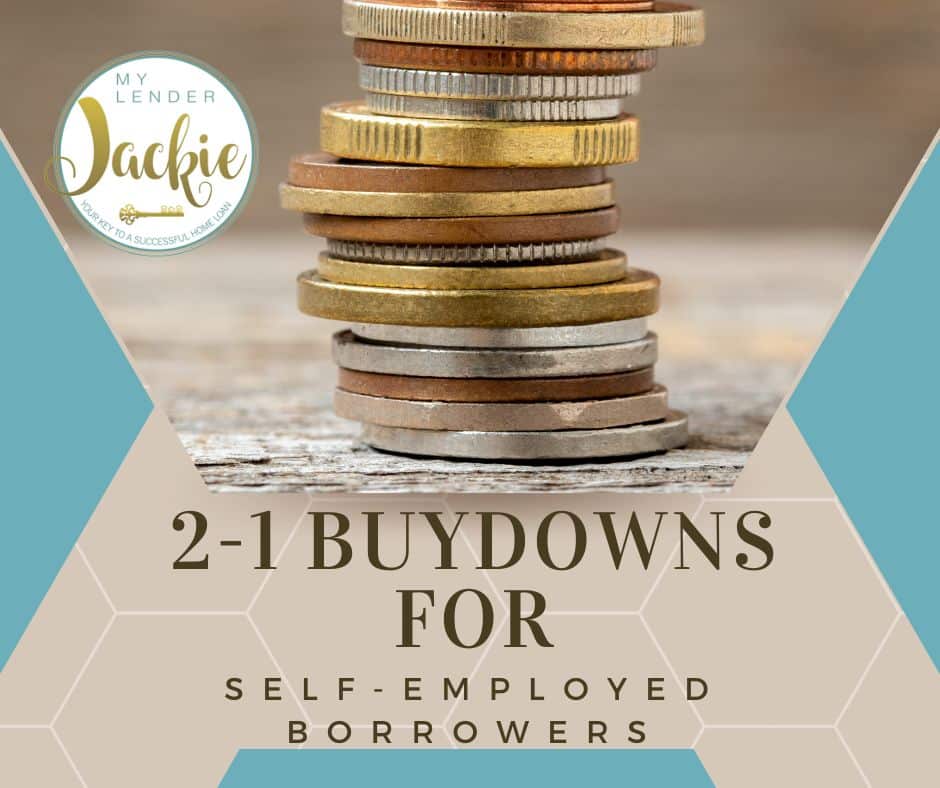2-1 Buydowns for Self Employed Borrowers – Have you heard about a 2-1 buydown? This mortgage solution can provide borrowers with an way to lower their mortgage interest rate temporarily, and is often ideal for self-employed borrowers.
Keep reading for everything you need to know about a 2-1 buydown as a self-employed mortgage applicant. If you are looking to speak with a loan officer and learn more, we are always here to help. Contact us any time!
2-1 Buydowns for Self Employed Borrowers
What is a 2-1 Buydown?
A 2-1 buydown is a way to lower your mortgage interest rate by 2% at closing. By paying upfront, the interest rate will be reduced by 2% the first year, 1% the second year, and then the current market rate after that.
The amount that is paid upfront for the 2-1 buydown is calculated by adding up the difference between 24 monthly principal & interest payments at the lower rates, and what those payments would have equaled at the higher rate.
For example, let’s say the borrower is getting a $600,000 loan at 6%. Before the 201 buydown, the monthly principal & interest payment would be $3,597. With a 2-1 buydown, the principal & interest for the first 12 months at 4% would be $2,864, and then it would be $3,221 at the 5% rate for the following 12 months.
Over those 24 months, the borrower would save $13,308 on principal & interest payments ($733/month for the first year and $376/month for the second year).
This means the cost for a 2-1 buydown on this mortgage would be $13,308, paid at closing. The key to this being a truly money saving solution is when the buyer does not pay that upfront money for the lower interest rate. In today’s market, many sellers are willing to cover some of this cost because of the shifting market and the flexibility provided by record high home equity.
Why is a 2-1 Buydown Good for Self-Employed Borrowers?
A 2-1 buydown can be an appealing mortgage solution for self-employed borrowers. If you have recently started a business or are building out part of your business to grow, chances are good that you anticipate making more money two years from now as you build your business. A 2-1 buydown may provide the perfect opportunity to ease into your mortgage payment, growing your income with a predictable timeline of when your mortgage payment will increase.
Is Now a Good Time for a 2-1 Buydown?
2-1 buydowns are not new to the mortgage world, but they are not always beneficial, depending on the market. While many buyers are worried about buying a home in today’s market, this is actually an ideal time to consider purchasing with a 2-1 buydown, for a few reasons:
- Most sellers today are holding on to record breaking home equity, which gives them the flexibility to offer a 2-1 buydown without sacrificing the purchase price they want.
- A decrease in demand for housing creates more motivation for sellers to make concessions.
- Many market experts predict a lowering in interest rates in the next 2 years, which means the market rate at the end of a 2-1 buydown that begins now is likely to be a favorable situation.
Who Pays for a 2-1 Buydown?
When a buyer funds the 2-1 buydown, the financial benefit is minimal (other than paying upfront to lower your monthly expenses). However, when you are able to fund some or all of the buydown cost through seller concessions or from your realtor, this is a truly money-saving solution. In today’s market, both sellers and agents are often motivated to offer this as a way to create a win-win transaction.
Want to learn more about a 2-1 buydown or applying for a mortgage as a self-employed person? We can help! Contact us any time.
More Advice on Self-Employment Loans


